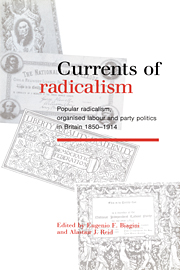 Currents of Radicalism
Currents of Radicalism Book contents
- Frontmatter
- Contents
- Notes on contributors
- Preface
- 1 Currents of radicalism, 1850–1914
- Part I Continuities in popular radicalism
- Part II The Liberal party and the people
- 6 Trade unionists, Gladstonian Liberals, and the labour law reforms of 1875
- 7 Popular Liberals, Gladstonian finance, and the debate on taxation, 1860–1874
- 8 Gladstone and his rivals: popular Liberal perceptions of the party leadership in the political crisis of 1885–1886
- Part III Radicals, Liberals, and the Labour party
- Index
8 - Gladstone and his rivals: popular Liberal perceptions of the party leadership in the political crisis of 1885–1886
from Part II - The Liberal party and the people
Published online by Cambridge University Press: 07 September 2010
- Frontmatter
- Contents
- Notes on contributors
- Preface
- 1 Currents of radicalism, 1850–1914
- Part I Continuities in popular radicalism
- Part II The Liberal party and the people
- 6 Trade unionists, Gladstonian Liberals, and the labour law reforms of 1875
- 7 Popular Liberals, Gladstonian finance, and the debate on taxation, 1860–1874
- 8 Gladstone and his rivals: popular Liberal perceptions of the party leadership in the political crisis of 1885–1886
- Part III Radicals, Liberals, and the Labour party
- Index
Summary
This chapter has evolved from a wider study of the first Home Rule crisis, undertaken in reaction to the exclusively ‘high political’ perspective of Dr A. B. Cooke and Professor John Vincent's The Governing Passion. Its starting point is an observation made by Dr Peter Marsh in an essay on Joseph Chamberlain's role in the Liberal schism, that ‘the passions aroused by that crisis among politicians in Britain had little to do with Ireland and an extraordinary amount to do with loyalty among leaders, friends and followers’. He argues that, notwithstanding the title of their study, Cooke and Vincent tended to underplay the element of ‘passion’ which the crisis generated. Marsh's own analysis of the part played by Chamberlain's tempestuous personality goes some way to redrawing the picture. By drawing on a wide range of manuscript, pamphlet and newspaper sources, this chapter aims to show that the personal attachments and enmities which were so powerful a force in the world of Westminster were no less real in the constituencies. Indeed, though rank-and-file radicals were often very conscious of the peculiarity of the problems of Ireland and some of the Lib.–Labs. had been supporting devolution for years, many Liberal supporters were unfamiliar with Home Rule as a question of practical politics; and given the uncertainty and the conflicting emotions which its adoption as party policy aroused, it might be argued that the personalities of the leading figures assumed a proportionately greater influence at local level than they did even at Westminster.
- Type
- Chapter
- Information
- Currents of RadicalismPopular Radicalism, Organised Labour and Party Politics in Britain, 1850–1914, pp. 163 - 184Publisher: Cambridge University PressPrint publication year: 1991


